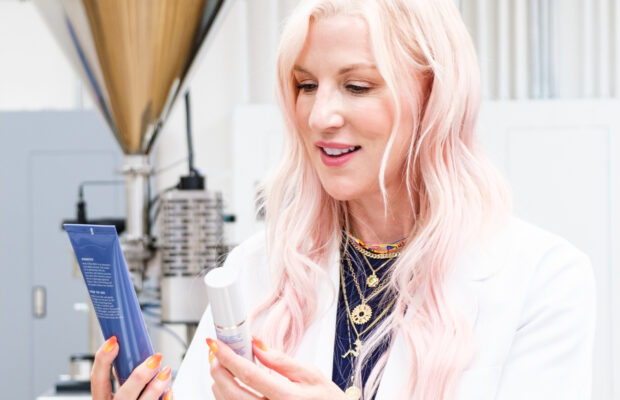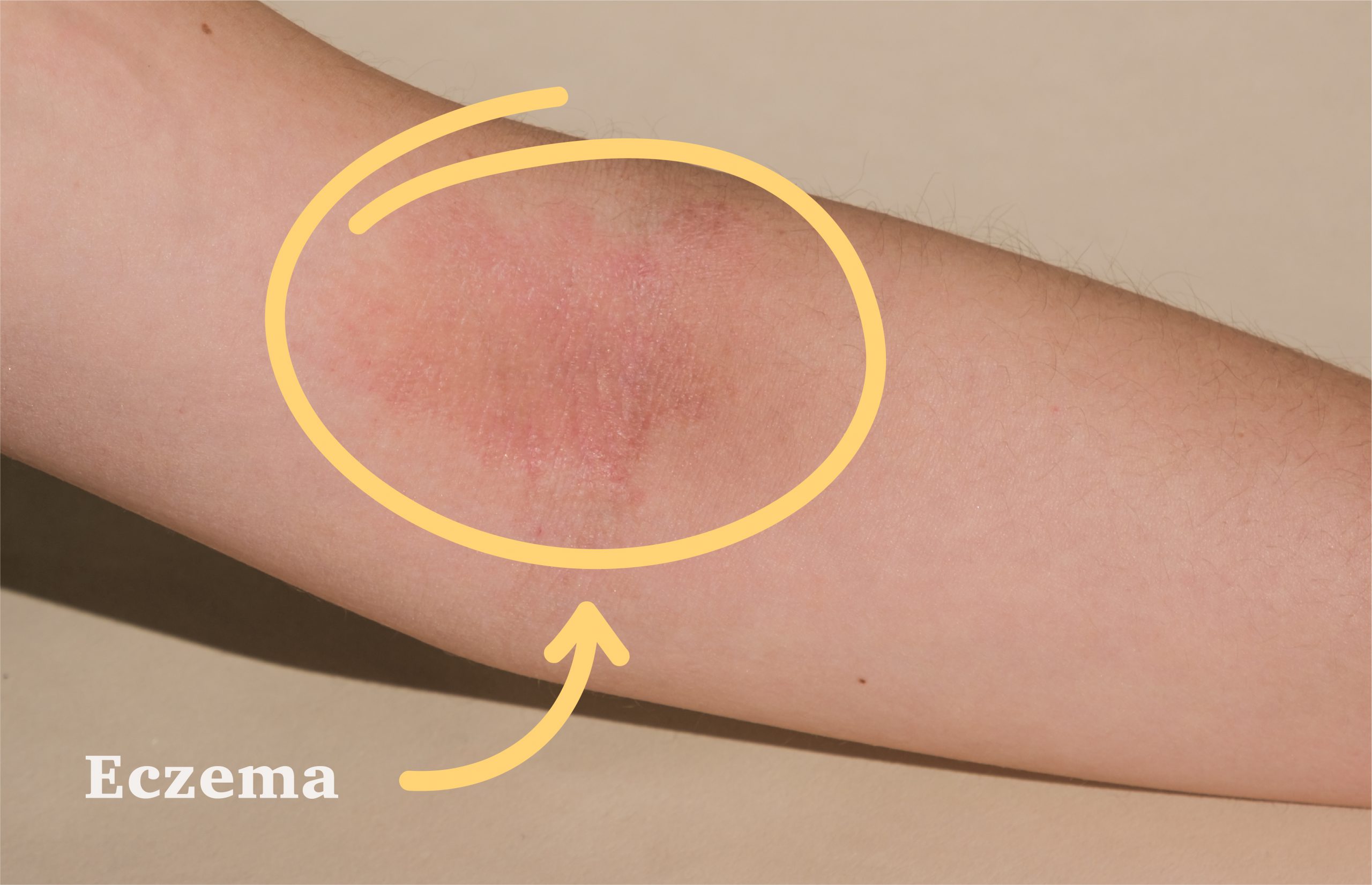In today’s saturated skincare market, it can be overwhelming to navigate through the countless options available. With new brands popping up every day, and each claiming to be superior, it’s only natural to question: What makes one better than another? If they all have access to the same ingredients, then what’s the difference? This is a fair point. Attending ingredient trade shows, such as Supplier’s Day for formulators and chemists, exposes me to aisles teeming with individuals selling raw materials and prototypes. In theory, everyone can tap into these materials, but true innovation in skincare products is made through formulation and application.
I think of it like baking a cake. Though we all may use the same ingredients, the resulting flavor can vary drastically. Someone may have used an extra pinch of salt or one less egg, making a world of difference in the finished product. Skincare works in exactly the same way. We all have access to the same ingredients, but it’s up to the chemist to find innovation in product formulation. Let’s dive into how they do this!
Where Innovation In Skincare Is Taking Place
Skincare products today are formulated with the same ingredients that have been used forever. Take a look at the ingredients label for any older creams, cleansers, etc. and you’ll see that they aren’t much different from those used today. Why is this? Simply because they are tried and true. However, a product formulator can still find ways to be innovative during product formulation. With over 30 years of experience as an esthetician, I’ve seen a lot of skin, and because of this, I have become well-versed in creating innovative products for it. Here’s how!
Delivery methods
Advancements in delivery methods of skincare products have caused a shift toward more potent products. For example, the use of smaller molecules in skincare allows products to penetrate deeper into the skin. By using smaller molecule sizes of ingredients like hyaluronic acid, we are able to penetrate through the skin barrier and attract water internally to plump the skin from underneath.
Textures
What was once just creams and lotions, is now a world of serums, oils, lightweight gels, and innovative dual-phase cleansers like Better Than Balm (The cleanser that solved the problem caused by thick, waxy balms!). The reason advancements in product textures are such a big deal is that different textures impart different effects. Some lightweight products will absorb faster than others which makes them ideal for layering while some will absorb more slowly into the skin for deeper, restorative effects. Some are light and airy which are perfect for oily skin, while others are thick and creamy to provide extra nourishment. Some products, like cleansers, are smooth for everyday use, while others use gentle exfoliating beads to provide exfoliation on days your skin needs a boost. These advancements in product textures bring new ways to use products and additional benefits that were not previously available.
If you’ve ever tried our Triple Berry Smoothing Peel, you may have been surprised at the somewhat chunky texture (and fruity smell) of this peel. The reason behind this? We actually use real fruit– that’s right, 100{9b0cebfefecba0e6bdf45dab380ff2aef24117588e828b835bd9eccaf84e3974} fresh berries, seeds and all. This is an unconventional ingredient in the skincare world, and quite frankly an expensive one, but investing in quality ingredients like this can really make a product stand out amongst competitors (and this peel certainly does).
Pharmaceutical and Medical Advancements
Ingredients that have been traditionally used for non-skincare purposes are now finding their way into the beauty industry. In fact, a lot of ingredients that get picked up in skincare are often due to medical researchers discovering that a specific ingredient is useful for wound healing, skin brightening, etc. For example, witch hazel, previously used in wound healing and as a vasoconstrictor in modern medicine, is now used for soothing the skin and reducing excess oil production. Tranexamic acid is a popular oral medication for preventing blood clots that has more recently shown a lot of promise for treating melasma, sun spots, age spots, and other forms of discoloration. Even Botox, popular in the modern day for smoothing fine lines and plumping the skin, was first used as a treatment for Parkinson’s.
Brand Values
Another component of product formulation can be effected by a brand’s values. For example, I choose not to formulate any of my products with synthetic dyes or colorants, petrolatum, artificial fragrances, and other ingredients that I don’t believe belong in skincare. Other brands may have sourcing strategies against POM derived ingredients or only ingredients that have been up-cycled. While not proprietary, brands can certainly make themselves unique in this perspective. This can help them attract customers looking for something specific, like ingredients that fit their personal values.
Proprietary Ingredients
When it comes to patenting ingredients, this isn’t something that just anyone can do with any ingredient. Ingredients have to be patented for a purpose, such as for use in cosmetics. And while one ingredient company may not want another to have access to a certain ingredient, if they are able to obtain a patent, they’ll want to sell it to as many brands as possible so that they can make their money back. After all, if you do it correctly, it costs anywhere between 10 to 20 million dollars to develop a new ingredient on the market considering all of the research and development, clinical testing, safety substantiation, and commercialization of the product.
Sometimes they’re not even inventing an ingredient, but rather a combination of ingredients. One example is vitamin C and E. Medical literature shows that these help stabilize each other, like in our Vitamin C&E Treatment. Vitamin C ascorbic acid is known to be very hard to stablilize, so when it was discovered the pairing it with vitamin E and hydroxycinnamic acid kept it stable and prevented it from oxidizing, it was quickly patented by a very large company. Since they were the only people to have it on the market, they were able to charge a lot for it. This is why some brands are able to get away with charging so much money for a product, because people are willing to pay for something that nobody else has.
At the end of the day, while we all have access to the same ingredients for the most part, it’s what we do with these ingredients that make a difference. Additionally, there’s more to skincare than just the products you use. Your routine, knowledge of ingredients, and skin concerns are what make your products unique to you. Everything that touches your skin should be determined by your skin’s needs and goals. That’s why I believe that educating yourself on your skin type (starting with a skin type quiz) is a key component in achieving clearer, healthier skin.
Speaking of innovative skincare products, here are five reasons you’ll love Rapid Response Detox Masque.
Celebrity Esthetician & Skincare Expert
As an esthetician trained in cosmetic chemistry, Renée Rouleau has spent 30 years researching skin, educating her audience, and building an award-winning line of products. Her hands-on experience as an esthetician and trusted skin care expert has created a real-world solution — products that are formulated for nine different types of skin so your face will get exactly what it needs to look and feel its best. Trusted by celebrities, editors, bloggers, and skincare obsessives around the globe, her vast real-world knowledge and constant research are why Marie Claire calls her “the most passionate skin practitioner we know.”



